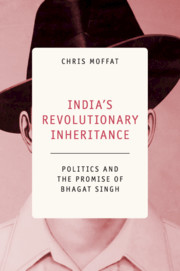Summary
Chapter 3 begins with the surrender of Bhagat Singh to colonial authorities following the bombing of the Legislative Assembly on 8 April 1929. The object of this chapter is to situate Bhagat Singh’s politics in relation to legal order, reading the revolutionary’s confrontation with colonial law not as part of some call for an alternative legality but as a theatrical event which detaches an idea of justice from the authority of code, locating it instead in the courage of a stance and the nature of a commitment. The chapter provides an innovative rereading of the Lahore Conspiracy Case, which saw Bhagat Singh sentenced to death for ‘conspiring to wage war against the King-Emperor’. It explores Bhagat Singh’s acceptance of this fate, his relationship to his comrades in the colonial prison and the now-mythologized acts of resistance characterizing the weeks and months up to his hanging on 23 March 1931. The chapter is critical in setting the terms for the revolutionary’s popular uptake in nationalist hagiography, before and after his death at the gallows. It outlines a responsive, relational idea of justice, contributing to a growing literature on South Asian legal cultures.
Prologue to Part II Keywords: martyrdom, contagion, incitement, violence, foundation, anarchy
Prologue to Part II abstract: Part II of the book begins with Bhagat Singh’s hanging on 23 March 1931. In this brief prologue, I raise the question of sacrifice and argue that if Bhagat Singh’s martyrdom sets up a cause as ‘interminable’, it is not some stable idea of community but the glory of struggle itself. His acceptance of death is framed not in foundational terms but as the heroic affirmation of a fight: a call to arms and escalation rather than mourning and retreat. It is, in this sense, constitutively demanding. The three chapters in Part II interrogate the variant ways that living communities have come to negotiate the demand proffered by Bhagat Singh, focusing particularly on the twenty-first century but also surveying the decades since Indian independence in 1947. The discussions are used to draw broader conclusions about the function of revolutionary ‘afterlives’ in post-colonial politics.

